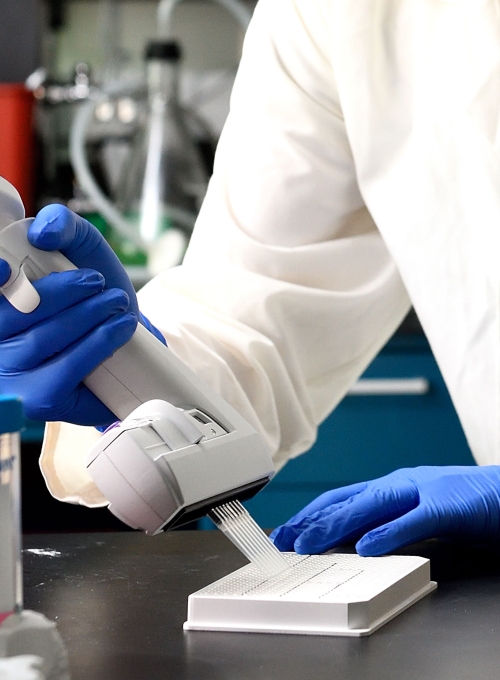
Kimiko L. Krieger Lab
Using spatial biology and multi-omics to understand nucleotide metabolism and DNA repair in prostate cancer
About the Krieger Lab
The Krieger Lab is focused on understanding how changes in metabolism impacts cancer progression, identifying metabolic pathways that contribute to prostate cancer disparities in African American men, and exploring how we can use this information to find better targets and develop improved cancer therapies. In addition, our laboratory vision is to “bring the bench to the public and the public to the bench” by building and strengthening community partnerships, providing cancer prevention education, and providing pathways for youth interested in STEM careers.

Research Overview
The Krieger Lab studies the intersectionality of metabolism and DNA damage in African American men with prostate cancer and how metabolic pathway rewiring supports defects in DNA repair. DNA damage repair pathways are critical for maintaining genome stability and preventing the accumulation of damage leading to tumorigenesis. Nucleotide metabolism pathways are critical rate-limiting processes for DNA repair capacity as they support DNA repair by maintaining nucleotide pools necessary to repair single-strand and double-strand breaks.
Our laboratory will use multi-omics, spatial and molecular biological approaches to target novel vulnerabilities in DNA damage repair and nucleotide metabolism pathways. Elucidating the intersection of these pathways will improve our understanding of cancer susceptibilities in African American men and tailor chemotherapeutic strategies.
Nutrition and Cancer
One Krieger Lab project aims to understand the role of diet and dietary habits that may contribute to cancer risk. Research has shown that men with low folate levels are more likely to have poorer outcomes with prostate cancer. Our lab is exploring the role of low folate and vitamin B12 levels in men and how this impacts prostate cancer risk and progression of the disease. We hope to further understand, on a molecular level, how improved dietary habits can change patient outcomes.

Selected Publications
- Goel K, Venkatappa V, Krieger KL, Chen D, Sreekumar A, Gassman NR. PARP inhibitor response is enhanced in prostate cancer when XRCC1 expression is reduced. Nucleic Acids Research Cancer, 2025.
- Krieger KL, Mann EK, Lee KJ, Bolterstein E, Jebakumar D, Ittmann MM, Dal Zotto VL, Shaban M, Sreekumar A, Gassman NR. Spatial mapping of the DNA adducts in cancer. DNA Repair, 2023.
- Krieger KL, Gohlke JH, Lee KJ, Piyarathna DWB, Castro PD, Jones JA, Ittmann MM, Gassman NR, Sreekumar A. Repair-Assisted Damage Detection Reveals Biological Disparities in Prostate Cancer between African Americans and European Americans. Cancers, 2022.
- Krieger KL, Hu WF, Ripperger T, Woods NT. Functional Impacts of the BRCA1-mTORC2 Interaction in Breast Cancer. International Journal of Molecular Sciences, 2019.
- Hu WF*, Krieger KL*, Lagundžin D, Li X, Cheung RS, Taniguchi T, Johnson KR, Bessho T, Monteiro ANA, Woods NT. CTDP1 regulates breast cancer survival and DNA repair through BRCT-specific interactions with FANCI. Cell Death Discovery, 2019. *Equal contribution.
How to Join the Krieger Lab
Krieger Lab members join us from many pathways.
PhD Students
The Krieger Lab is part of the Biochemistry and Molecular Biology PhD Program, which provides full tuition and stipend support.
Master's Students
The Krieger Lab lab takes students from the Department of Biochemistry and Molecular Biology Master of Health Science and Master of Science programs. If you are a student in either program and are interested in the Krieger Lab, please contact Kimiko Krieger by email.
Undergraduate Students
The Krieger Lab hosts undergraduates from a variety of programs. If you are interested in joining the Lab as an undergraduate, please contact Kimiko Krieger by email.
Postdoctoral Fellows
To apply to be a postdoctoral fellow in the Krieger Lab, please contact Kimiko Krieger by email. In addition to training within our lab, the Biochemistry and Molecular Biology Department has an active postdoctoral training program.
